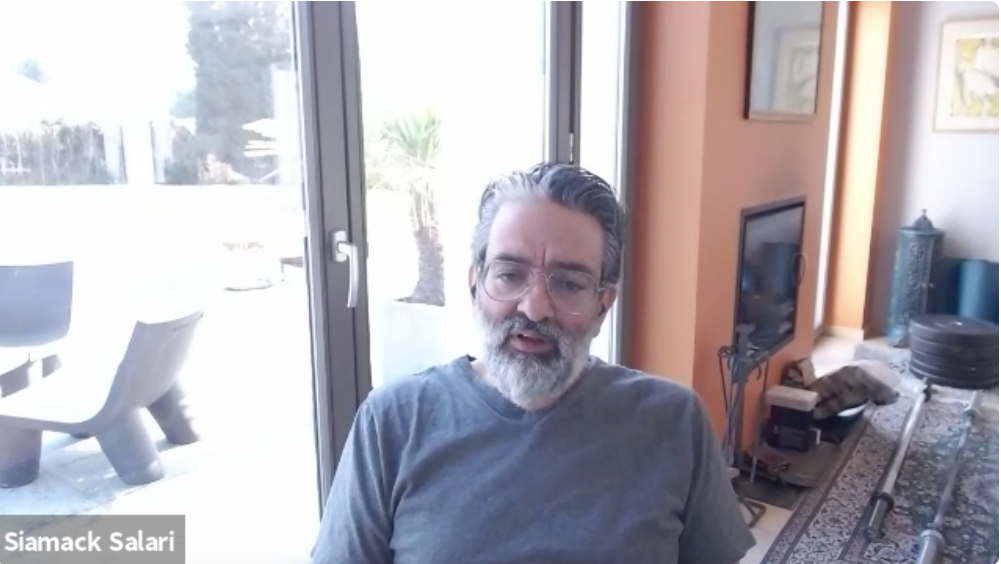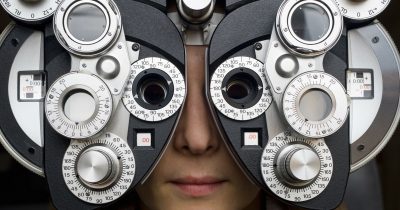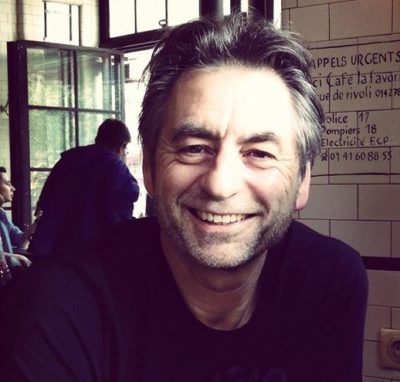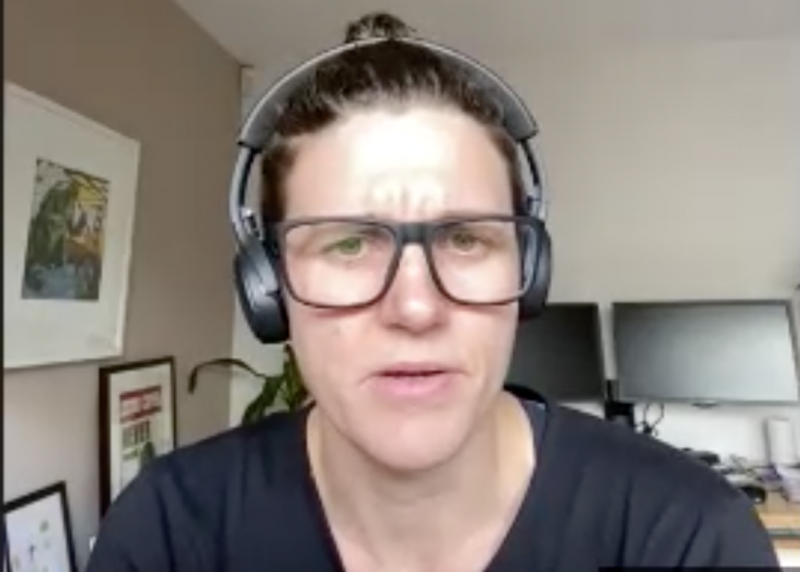Siamack Salari: Trying to make sense when this ain’t everyday life
Today we are joined by Siamack Salari.
Belgium based ethnographer and lecturer in observational research at leading universities in the UK, France and India, and visiting fellow at King’s College London. Ex head of foresight, tech co-founder, advertising strategist and ever observer of human and cultural behaviours.
Siamack has also just launched a global open source project ‘Not Everyday Life.’ Working with people from across the world to conduct interviews to help ultimately make sense of the chaos we are living through. The collaborative project will be an exploration of changing behaviours and attitudes at this time, but most importantly, tries to understand: which behaviours and attitudes will stick in a post pandemic world.
A most fascinating discussion trying to make sense of it all.
Find Siamack via LinkedIn and his amazing global project ‘Not Everyday Life‘ here!
Podcast summary
How do we make sense of something where people, businesses and the world have literally gone from something to nothing, overnight? How will that change people?
There is a new normal now that is working itself out. A lot of behaviours are still forming, knee jerk panic reaction that were seeing but we will settle into new routines and new behaviours in this new reality that we are living in.
Priorities are going to change in terms of what is important to us. There is an elevated community appreciation. Appreciating your community and the people in your community and reaching out.
We are realising who are the people who really matter to you? That’s what becomes important.
The most important thing isn’t so much how things are changing but the big question, is what will actually stick?
So how do we make sense of it all?
By trying to identify root causes behind behaviours. People have this dual reality. Why do people have a reality of these beliefs and then they have another reality?”
“As we get through this and as it becomes our new kind of normal, I don’t think it will be as dramatic as a line in the sand. It won’t be a momentous change. I think a lot of habits will return, there will be lot of variations on these habits as human beings, certain traits will perpetuate.”
Detailed Key insights
A people watcher – industrial design – how it fits in peoples everyday lives
- General / initial thoughts on the COVID-19 situation.
- Interesting that the things you think about twice, suddenly becomes hugely, massively important
- There is something to say about people’s realities and applying different rules to different realities.
- Constantly zig zagging around people on the street. How else are we zigzagging?
- Human Behaviour – cultural change in this situation. How is everything really changing?
- Reaching out to people who are alone
- Anybody who is anywhere can reach out to someone else.
- Working from home
- People worried about losing jobs, how long a company will be going, projects cancelled
- Sense Making – an International research project
- https://noteverydaylife.com/
- A global crowdfunded initative to understand life in a post pandemic world. A Report of what is going on and what people are doing. Sense Making.
- Interviewing (ideally) people that are 3 people removed from them (not interviews, but rather conversations to capture interesting anecdotes and stories.
- Follow the same discussion guide, prepare a 1 page report under the set headings
- Put these in a pool and all contributors will get access Shared access – sort by country, segments identified
Key Quotes
“What is going on, what people are doing, the most important thing for me isn’t so much how things are changing but the big question is what’s going to stick? What will actually stick?”
“There is a new normal now that is working itself out, I’m sure when people start discovering their local butcher and local businesses and that they can deliver food to them, that will be one change, the fact that people are opening their doors and windows at 8pm and giving a round of applause to front line workers (a pattern that’s started here) appreciating your community and the people in your community and reaching out.”
“Literally going from something to nothing overnight. How will that change people? How will people protect themselves in the future? Will they stop putting all their eggs in one basket or will they start thinking about multiple sources of income and so on?” [26:00]
“This [the sense making project] is about trying to identify root causes behind behaviours. So you can report on a behaviour, but when you see variations on that behaviour you can start to drill down on that and break down what is it that creates that situation? That’s where we are trying to get to and understand.”
Elevated attention to community (32:25)
“Who are your neighbours, who are the people around you, who needs help, who can help you, who is available to help you?”
“I’m still waking up every morning and it takes me about 30 seconds to go from ‘I’ve just woken up ‘ to ‘oh my god, were in this situation. It still hasn’t become normal to me. I still have to go through replaying it in my head. It’s quite shocking.’
(33:20)
“This is a big one for me. Who are the people who really matter to you? That’s what becomes important. And you realise that those people that matter to you before, such as your local supermarket being open when you wanted it to, is potentially where you can go and get killed. Potentially. And you just don’t want to go there and actually there are people who will deliver and leave it on your front door, where you don’t even have to see them. The number of times I’ve had doorbells ringing and it’s a delivery, I open the door and the driver is already reversing AT SPEED up our driveway and waving out the window. He didn’t even want to breathe in my direction and vice versa.”
“So I think priorities are going to change in terms of what is important to us. I’m calling my mum up every day. I never used to call her up”. My kids are learning to cook on their own. There is a self-sufficiency that might kick in. There are people buying chickens for their own eggs.”
Global v local 34:40
[Jason] Counterbalancing globalisation, the idea that global just seems so stressful and big and it hasn’t delivered what we promise so rather than being global, how do we come back to being local. Now we are being forced to do that. Sustainability vs growth. Been so busy, now forced to pause 35:25
(airline example 35:55)
“Stop and pause and also realise, so for example it’s only now that I’m starting to think of these airlines that are now begging their Governments for bail outs. These are the same airlines that charge you again to choose your seat, after you’ve already paid for it and every little thing they charge you for after that. These are the millionaire, billionaire owners of these companies who have squeezed the rest of us for everything they could. And now they are going back to the Government. Now we are sitting here, we have time to process this new realisation that these huge organisations, companies, institutions need to rethink themselves, reinvent themselves. This capitalism has to change”
What then is the outcome?
“Businesses being kind”
“You can make profit by being nice to people” [38:15]
“You can’t lose sight of profit” [41:00]
The right tone for brand promotion and advertising [43:20]
Be understanding, empathetic and relevant.
“Understand what people’s challenges are and go and solve them. Don’t send me emails on what your Corona Virus policy is. I don’t care. Leave me alone.”
“Brands for one second [need to] reach out and forget who they are and think about who we are and what we are trying to do” [47:00]
The fear of the unknown. [51:20]
“There will be habits and behaviours that change fundamentally. We just don’t know what they are yet. You cant ask people because they don’t know. The best we can do is understand what the root causes of the behaviour change is.”
“What will it be like after – will we always fear this happening again?”
“Fear of the unknown will have some fundamental changes”
[57:00]
Behaviour contradictions – A “dual reality”
“Saying one thing and doing another. Or saying one thing at one point and doing something at another. Researchers tend to push these aside and focus on things that you understand and not worry about the things you don’t.”
“For example. My mum and lots of people like her (she is 81) years old and I’m asking her to stay indoors and she agreed with me. And on the other hand, my sister called me up to say she [mum] had gone to Marks and Spencers yesterday, to go shopping. I had to call her up and I had to raise my voice slightly and I had to say ‘if you die, if you’re taken ill and you die, you’ll be by yourself. AND you probably won’t get a ventilator because they aren’t available for people over a certain age. I think I scared the life out of her.”
“People have this dual reality. On one hand they realise that it’s a killer and that its important to socially isolate and on the other hand they are doing things that are completely inexplicable – so there’s lots of contradictions in the way people are behaving.”
“Why do people have a reality of these beliefs and then they have another reality?”
Real People is a podcast hosted by Jason Dunstone, the founder and managing director of Square Holes. Subscribe to Real People on your favourite podcast player.
Jason builds on his 25 years of conducting human-centred research, interviewing average and not so average people (rich, poor, old, young, content and vulnerable) to understand what they believe and how they behave.
Best listened to via iTunes

Or Stitcher.
Real People is a podcast hosted by Jason Dunstone, the founder and managing director of Square Holes, 25 years conducting research and interviews with average and not so average people, as well as interviews with key leaders such as innovators, politicians, scientists and experts. He has have been lucky to meet such wonderful and intelligent people, and have such fascinating discussions, but these are often largely deciphered down to research findings, insightful quotes, statistics et cetera for reports. Real People opens up such conversations for people like you
Subscribe to Real People on your favourite podcast player.
Best listened to via iTunes





